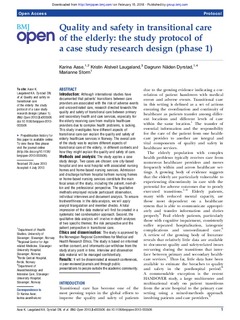Quality and safety in transitional care of the elderly: The study protocol of a case study research design (phase 1)
Journal article

Åpne
Permanent lenke
http://hdl.handle.net/11250/2485367Utgivelsesdato
2013Metadata
Vis full innførselSamlinger
Originalversjon
Aase, K., Laugaland, K. A., Dyrstad, D. N. & Storm, M. (2013). Quality and safety in transitional care of the elderly: The study protocol of a case study research design (phase 1). BMJ Open, 3(8). 10.1136/bmjopen-2013-003506Sammendrag
Introduction: Although international studies have documented that patients’ transitions between care providers are associated with the risk of adverse events and uncoordinated care, research directed towards the quality and safety of transitional care between primary and secondary health and care services, especially for the elderly receiving care from multiple healthcare providers due to complex health problems, is lacking. This study investigates how different aspects of transitional care can explain the quality and safety of elderly healthcare services in Norway. The overall aim of the study was to explore different aspects of transitional care of the elderly, in different contexts and how they might explain the quality and safety of care.
Methods and analysis: The study applies a case study design. Two cases are chosen: one city-based hospital and one rural hospital with associated nursing homes and home-based nursing services. Admission and discharge to/from hospital to/from nursing homes or home-based nursing services constitute the main focal areas of the study, including the patient, next-of-kin and the professional perspective. The qualitative methods employed include participant observation, individual interviews and document analysis. To ensure trustworthiness in the data analysis, we will apply analyst triangulation and member checks. A total impression of the data material will first be created in a systematic text condensation approach. Second, the qualitative data analysis will involve in-depth analyses of two specific themes: the risk perspective and the patient perspective in transitional care.
Ethics and dissemination: The study is approved by the Norwegian Regional Committees for Medical and Health Research Ethics. The study is based on informed written consent, and informants can withdraw from the study at any point in time. Interview and observation data material will be managed confidentially.
Results: It will be disseminated at research conferences, in peer-reviewed journals and through public presentations to people outside the academic community.
